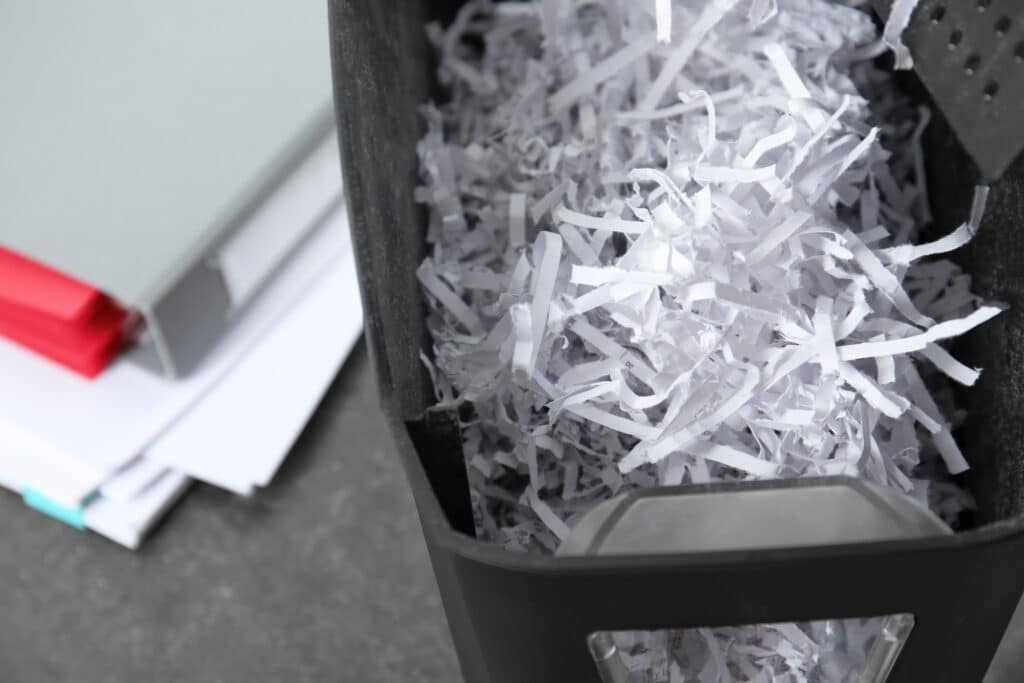-
December 5, 2022
How Does Your Educational Institution Handle Shredding & FERPA Requirements?

How does your educational institution handle shredding and FERPA requirements?
We’re getting close to the end of the year and 2023 is on the horizon! The coming weeks will be filled with happy gatherings of loved ones, scrumptious feasts, and much-needed time off from studying. It’s a great time to start shredding private and sensitive material pertaining to your job or academic institution.
In general, a lot of individuals hold onto vital documents until the end of the year, but a lot of people will throw away private information from their jobs or places of business without recognizing they are sensitive documents, which poses a serious risk to your online identity. Your identity can be compromised with just one discarded piece of information and one skilled set of criminal hands. Particularly younger pupils are more likely to unknowingly discard private documents. FERPA was enacted for this reason.
FERPA: What is it?
The Federal Educational Rights and Privacy Act, or FERPA, was created in 1974 and consists of numerous laws and regulations for document storage and destruction in educational establishments. (See Legal summary of FERPA at the end of the Blog) Additionally, FERPA has rigorous limits for disclosing this data and the required signatures before data can be given to a third party for possession. It was developed in order to protect the privacy of students who are being helped by educational institutions.
The rules for keeping and discarding papers are as follows:
- Students’ personal information cannot be disclosed to third parties without their express authorization, either from their parents or themselves.
- Educational institutions must disclose the length of time that student records will be kept and may set their own timeframes for doing so.
- Records must be destroyed so that no information may be gleaned from them, according to each state’s specific regulations on record keeping and destruction.
Most schools make an effort to properly and legally destroy these materials. Following the distribution of records to the students, the destruction procedure frequently deviates from FERPA guidelines. Many students are unaware that it is against FERPA requirements to throw away outdated transcripts. Providing students with access to on-site disposal and shredding services is a wonderful approach to guarantee that you are FERPA compliant.
FROM THE US DEPARTMENT OF EDUCATION:
The Family Educational Rights and Privacy Act (FERPA) (20 U.S.C. § 1232g; 34 CFR Part 99) is a Federal law that protects the privacy of student education records. The law applies to all schools that receive funds under an applicable program of the U.S. Department of Education.
FERPA gives parents certain rights with respect to their children’s education records. These rights transfer to the student when he or she reaches the age of 18 or attends a school beyond the high school level. Students to whom the rights have transferred are “eligible students.”
- Parents or eligible students have the right to inspect and review the student’s education records maintained by the school. Schools are not required to provide copies of records unless, for reasons such as great distance, it is impossible for parents or eligible students to review the records. Schools may charge a fee for copies.
- Parents or eligible students have the right to request that a school correct records which they believe to be inaccurate or misleading. If the school decides not to amend the record, the parent or eligible student then has the right to a formal hearing. After the hearing, if the school still decides not to amend the record, the parent or eligible student has the right to place a statement with the record setting forth his or her view about the contested information.
- Generally, schools must have written permission from the parent or eligible student in order to release any information from a student’s education record. However, FERPA allows schools to disclose those records, without consent, to the following parties or under the following conditions (34 CFR § 99.31):
- School officials with legitimate educational interest;
- Other schools to which a student is transferring;
- Specified officials for audit or evaluation purposes;
- Appropriate parties in connection with financial aid to a student;
- Organizations conducting certain studies for or on behalf of the school;
- Accrediting organizations;
- To comply with a judicial order or lawfully issued subpoena;
- Appropriate officials in cases of health and safety emergencies; and
- State and local authorities, within a juvenile justice system, pursuant to specific State law.
Schools may disclose, without consent, “directory” information such as a student’s name, address, telephone number, date and place of birth, honors and awards, and dates of attendance. However, schools must tell parents and eligible students about directory information and allow parents and eligible students a reasonable amount of time to request that the school not disclose directory information about them. Schools must notify parents and eligible students annually of their rights under FERPA. The actual means of notification (special letter, inclusion in a PTA bulletin, student handbook, or newspaper article) is left to the discretion of each school.
Request an estimate on our website or by calling 860-627-5800 to learn more. Our experts will ask you a few questions to better understand your requirements, after which they will tell you exactly what to expect from start to finish, including the cost.
Popular Posts
Helpful Resources
Interested in Shred Events?
Come be a part of one of Infoshred’s upcoming Shred Events! We provide a safe, eco-friendly way to dispose of your confidential paper documents. With easy-to-reach locations and convenient dates, we’re here to help you safeguard your information while giving back to local causes.



